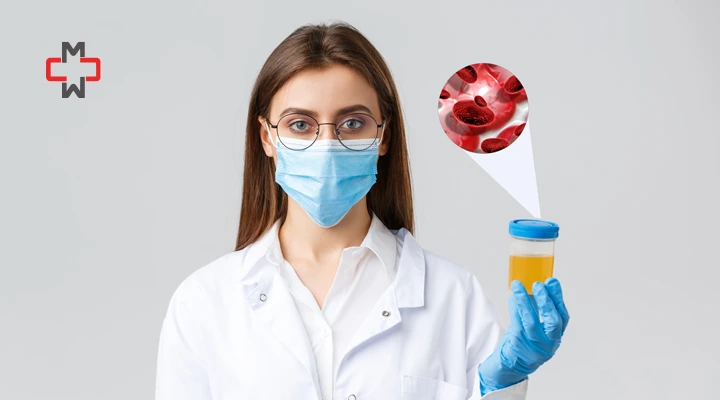Pneumonia Treatment
in NYC
If you’re feeling sick with a cough, fever, or trouble breathing, you may have pneumonia—a lung infection that can become serious fast. At Manhattan Medical Arts, we provide walk-in, online, and same-day appointments for pneumonia treatment in Manhattan and Forest Hills, so you can get expert care without delay.
Dr. Syra Hanif, our board-certified Primary Care Physician, brings years of experience diagnosing and treating pneumonia right here in NYC.
What is Pneumonia?
Pneumonia is a common and sometimes serious lung infection that affects people of all ages. It occurs when germs—such as bacteria, viruses, fungi, or parasites—cause inflammation in the air sacs of one or both lungs. These sacs can fill with fluid or pus, making it hard to breathe and causing symptoms that range from mild to life-threatening.
Types of Pneumonia
Bacterial Pneumonia
(most common in adults)
Viral Pneumonia
(Flu, RSV, COVID-19)
Fungal Pneumonia
(rare, usually in immunocompromised patients)
Aspiration Pneumonia
(when food or liquid enters
the lungs)
Hospital-acquired (nosocomial) Pneumonia
Symptoms of Pneumonia
in Adults
Recognizing pneumonia early is essential. Symptoms can start slowly or appear suddenly, and they often look like a severe cold or flu. Understanding what to look for can help you know when it’s time to get medical care before the infection becomes more dangerous.
Common signs and symptoms include:
Cough (With Green, Yellow, Or Bloody Mucus)
Fever and
Chills
Chest Pain when Breathing or Coughing
Fatigue and
Weakness
Sweating
Headache
Loss of
Appetite
Confusion (Especially in Older Adults)
Blue Lips or Fingertips
(A Sign of Low Oxygen)
Causes and Risk Factors
Pneumonia doesn’t happen out of nowhere. It develops when germs enter your lungs and your body can’t clear them effectively. Some people are more likely to get pneumonia or have a more serious illness if infected.
Most common causes:
- Streptococcus pneumoniae (the most frequent bacterial cause)
- Influenza virus, RSV, COVID-19
- Mycoplasma pneumoniae (walking pneumonia)
- Legionella pneumophila (Legionnaires’ disease)
- Fungal spores (in certain environments)
Major risk factors:
- Age over 65
- Smoking
- Chronic lung conditions (COPD, asthma)
- Diabetes or heart disease
- Weak immune system
- Recent flu or cold
- Hospitalization or long-term care stays
How We Diagnose Pneumonia at
Manhattan Medical Arts
Getting an accurate diagnosis is key to starting the right treatment quickly. At Manhattan Medical Arts, our team uses proven testing methods to confirm pneumonia and figure out the cause.
Here’s how we test for pneumonia:
- A thorough medical history and physical exam to check breathing and overall health
- Chest X-rays on site to look for lung inflammation or fluid
- Blood tests (CBC) to detect infection
- Pulse oximetry to measure oxygen levels
- Sputum tests to identify bacteria
- Urine tests for certain bacterial infections like Legionella
Result: You get a clear diagnosis and a plan you can trust.
Our Pneumonia
Treatment Approach
Treatment depends on what’s causing your pneumonia, how sick you are, and whether you have other health conditions. Our goal is always to help you feel better as soon as possible and prevent complications.
Treatment options include:
Bacterial Pneumonia
Antibiotics that target the infection
Viral Pneumonia
Supportive care plus antiviral medication if needed
Fungal Pneumonia
Antifungal medications (for rare cases)
Aspiration Pneumonia
Specialized antibiotics and close monitoring
Severe Cases
Referral for hospital care, IV antibiotics, or oxygen therapy
You can access same-day visits, telemedicine consults, on-site X-rays, and blood testing all under one roof.
Why Choose
Manhattan Medical Arts
Choosing the right clinic makes a difference in how quickly you recover. At Manhattan Medical Arts, we blend medical expertise with compassionate, patient-centered care.
Here’s why so many New Yorkers trust us:
Local
Expertise
Care Designed For Manhattan And Forest Hills Residents
Dr. Syra Hanif’s
experience
Years Treating Pneumonia In Adults
Complete
Services
Walk-in, online, and same-day appointments
Insurance
accepted
Plus Self-Pay Options For Your Convenience
Trusted
Methods
Our Care Aligns With Guidelines From The CDC, NIH, And FDA
You can access same-day visits, telemedicine consults, on-site X-rays, and blood testing all under one roof.
Problem and
Solution
Pneumonia is serious—especially if treatment is delayed. Every year in the U.S., over 1 million people are hospitalized because of pneumonia, and about 50,000 die from it (CDC). But early diagnosis and treatment
can keep you out of the hospital and protect your health.
Our Solutions:
- Prompt, accurate diagnosis with same-day results
- Personalized treatment plans
- Monitoring to prevent severe complications
- Preventive care and education
Complications of Untreated Pneumonia
If pneumonia isn’t treated quickly, it can lead to life-threatening complications. That’s why it’s so important to get help early.
Possible complications:
- Respiratory Failure: Needing a breathing machine
- Sepsis: Infection spreading through your body
- Pleural Effusion: Fluid around the lungs
- Empyema: Pus collecting in the lung lining
- Lung Abscesses: Pockets of infection inside the lungs
Prevention Tips
and Patient Education
Prevention starts with protecting yourself from infections and keeping your immune system strong. We help our patients take proactive steps to reduce their risk.
What you can do:
- Get vaccinated:
- Pneumococcal vaccines (PCV15, PCV20, PPSV23) if
you’re 19–64 with risk factors or 65+ - Flu vaccine every year
- COVID-19 vaccine to lower viral pneumonia risk
- Pneumococcal vaccines (PCV15, PCV20, PPSV23) if
- Wash your hands often
- Avoid smoking
- Stay home when you’re sick
- Manage chronic illnesses
When to Seek Medical Help
Pneumonia can get worse quickly, so it’s important to know when to act.
Call 911 if you have:
- Severe trouble breathing
- Chest pain that feels crushing or heavy
- Blue lips or fingertips
- Sudden confusion or fainting
Call us or come in today if you have:
- Cough with green, yellow, or bloody mucus
- High fever with chills
- Shortness of breath
- Symptoms that aren’t improving
Frequently Asked Questions
What is pneumonia?
It’s an infection that fills the air sacs in your lungs with fluid or pus, making breathing difficult.
How do you get pneumonia?
By inhaling bacteria, viruses, fungi, or food/liquid into the lungs.
Is pneumonia contagious?
Bacterial and viral pneumonia can spread through coughs or sneezes.
How long can pneumonia last in adults?
Mild cases clear in 1–2 weeks; severe cases may take 6–8 weeks or longer.
How is pneumonia diagnosed?
With a physical exam, chest X-ray, blood tests, and sometimes sputum tests.
What makes pneumonia worse?
Smoking, delayed treatment, and chronic illness.
When should I see a doctor?
If symptoms are severe or not improving within a few days.
Latest Blog Posts
Making primary care accessible











